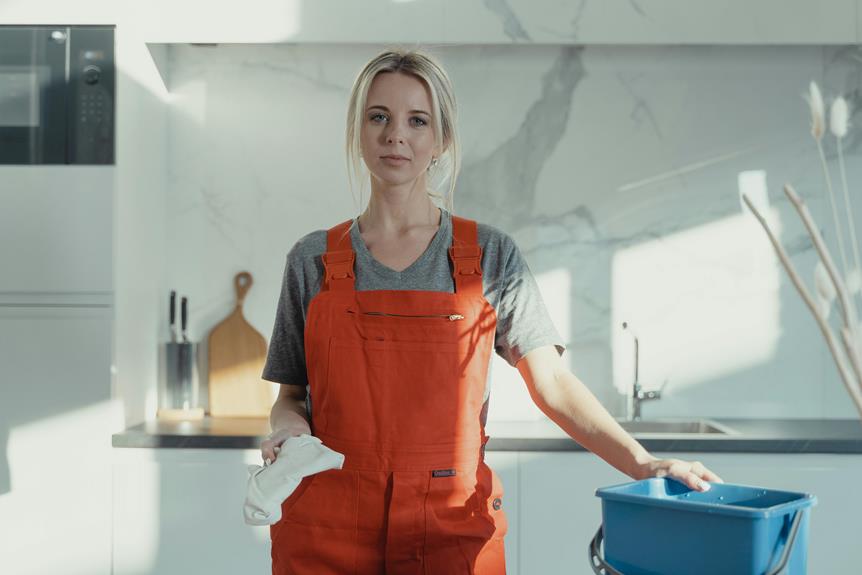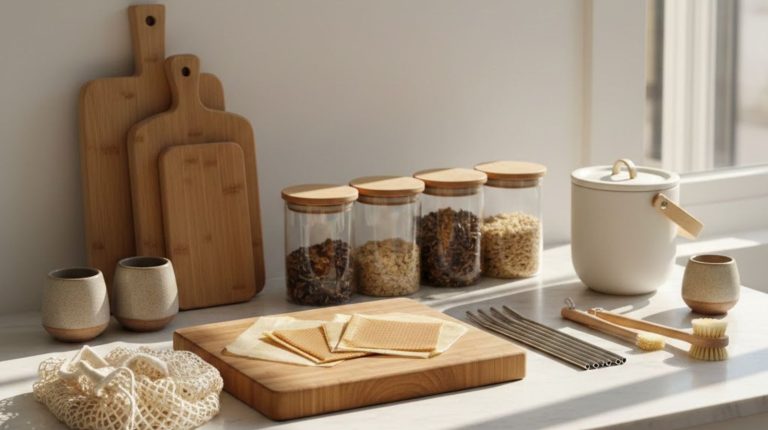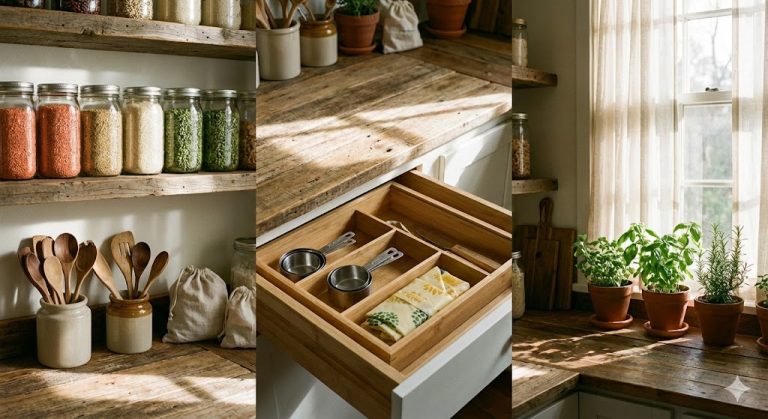In the pursuit of both cleanliness and environmental stewardship, eco-friendly kitchen cleaning methods offer a compelling alternative to conventional chemical-laden products. By leveraging common household items such as vinegar, baking soda, and lemon, one can achieve a high degree of cleanliness that rivals, if not surpasses, that provided by synthetic cleaners.
The efficacy of these natural substitutes, combined with their low cost and minimal ecological footprint, prompts a significant question: what other sustainable practices might we be overlooking in our daily routines? Exploring these alternatives not only supports global sustainability efforts but also protects personal health, presenting a dual benefit that merits further exploration.
Key Takeaways
- Utilize baking soda and vinegar for effective, non-toxic cleaning of grease and grime on kitchen surfaces.
- Create DIY citrus cleaners using lemon peels and vinegar to disinfect and freshen kitchen areas.
- Opt for biodegradable sponges and reusable cleaning tools to minimize environmental impact.
- Repurpose old textiles as cleaning rags and reuse containers to reduce waste.
- Avoid mixing essential oils with vinegar as it can neutralize cleaning properties, reducing effectiveness.
Raid Your Pantry
Transforming your kitchen into a hub of sustainability can begin with a simple step: raiding your pantry. By utilizing everyday items such as baking soda, lemon juice, and olive oil, you can create effective, eco-friendly kitchen cleaning solutions that liberate your home from the grasp of harmful chemicals.
Baking soda emerges as a champion in the domain of natural cleaning products. Its mild abrasive properties make it an exceptional choice for cleansing stovetops and microwaves, easily tackling tough, baked-on stains. When combined with water, it forms a potent all-purpose cleaner that can rejuvenate a variety of surfaces without leaving harmful residues.
Incorporating sustainable waste practices with the use of everyday kitchen items reduces overall waste and promotes environmental responsibility.
Lemon juice, known for its high acidity, acts as a powerful grease cutter and disinfectant. This makes it especially valuable for sanitizing cutting boards and kitchen counters, ensuring they are free from bacteria and other contaminants. Its fresh scent also contributes to a pleasant cleaning experience.
For those who treasure their wooden kitchen tools, olive oil is not just for cooking—it doubles as a natural polish that conditions and protects wood, preventing drying and cracking. Embrace these simple, natural solutions and step confidently towards a more eco-friendly and liberated lifestyle in your kitchen.
Embrace Vinegar’s Power
Vinegar, with its 5% acetic acid content, is not only effective at tackling grease and grime throughout the kitchen but also acts as a natural disinfectant. However, its acidic nature means it should be avoided on sensitive surfaces such as marble or stone to prevent damage. Understanding these applications and limitations allows for safer, more effective use of vinegar in maintaining a clean, eco-friendly kitchen.
Vinegar Cleaning Applications
Embracing the power of distilled white vinegar as an eco-friendly cleaning solution can revolutionize your kitchen maintenance routine. Recognized for its versatility, vinegar serves as a natural disinfectant and robust all-purpose cleaning agent. When diluted with water in a 1:1 ratio, this simple yet potent mixture tackles everything from grease and grime to stubborn stains, ensuring your kitchen not only looks clean but feels genuinely pristine.
Vinegar is particularly effective because it dries streak-free, which makes it an excellent choice for polishing glass, mirrors, and other shiny surfaces normally marred by traditional cleaners. Additionally, the environmentally friendly nature of vinegar means using it helps reduce the presence of harsh chemicals in your home, safeguarding both your health and the planet.
| Application | Benefit |
|---|---|
| Surface Cleaning | Removes dirt and stains effectively |
| Glass and Mirrors | Leaves a streak-free shine |
| Appliances Maintenance | Deodorizes and maintains hygiene |
Regularly incorporating vinegar into your cleaning routine not only promotes a healthier living environment but also aligns with eco-conscious values. Embrace the cleansing power of vinegar and transform your approach to kitchen cleanliness, merging efficacy with environmental responsibility.
Vinegar Limitations
While distilled white vinegar is celebrated for its cleaning efficacy and eco-friendly attributes, it is not without its limitations. Vinegar’s acidic nature, though advantageous for disinfecting and achieving streak-free results on glass, walls, and floors, presents challenges for certain materials.
Significantly, vinegar should never be used on marble or stone countertops. Its acidity can etch and dull the natural stone finish, undermining the very beauty it aims to preserve. This underscores the importance of selecting cleaning methods that respect the integrity of the material being cleaned.
Furthermore, while vinegar is often lauded for its compatibility with other natural substances, it is essential to avoid combining vinegar with baking soda for cleaning purposes. This mixture triggers a neutralization reaction, producing primarily saltwater, and consequently diminishing its effectiveness as a cleaning agent.
Instead, for a versatile and effective all-purpose cleaner, it is advisable to dilute vinegar with water in a 1:1 ratio. This blend maintains the disinfecting properties of vinegar, making it ideal for kitchen appliances and other surfaces that are not sensitive to acids, ensuring both cleanliness and surface safety.
Choose Durable Sponges
Choosing durable sponges is a key step in maintaining an eco-friendly kitchen. Opting for natural options like sea sponges or coco coir not only guarantees that your cleaning tools are biodegradable but also greatly reduces the environmental impact that comes with plastic sponges.
These natural alternatives are not only gentler on the planet but also on your wallet, as they tend to last longer than their disposable counterparts when properly maintained. To further enhance the sustainability of your kitchen, consider using biodegradable dish soaps that complement these eco-friendly cleaning tools, aligning with environmental values without sacrificing effectiveness.
Durable sponges, when paired with good care practices such as proper storage in dry, well-ventilated areas, can extend their usability, further diminishing the need for frequent replacements and thereby lowering overall waste. This change not only supports environmental sustainability but also promotes a more conscious and liberating way of living, freeing us from the relentless cycle of disposable products.
Moreover, incorporating tools like wooden dish and pot brushes can enhance the eco-friendliness of your kitchen. These items are not only effective in cleaning but are also compostable at the end of their life cycle, adding both function and a touch of rustic aesthetic to your kitchen environment.
Shifting to reusable, eco-conscious cleaning tools is a straightforward yet impactful step towards a more sustainable lifestyle.
Simple Sink Cleaning Reaction
To effectively clean your kitchen sink without harmful chemicals, begin by generously sprinkling baking soda over the sink’s surface. This common household item acts as a mild abrasive, perfect for scrubbing away tough stains and removing dirt without scratching the sink’s finish.
Gently rub the baking soda into the surface with a damp sponge, guaranteeing even coverage and ideal cleaning power. Incorporating natural lighting can further enhance your kitchen’s eco-friendliness by reducing the need for artificial lights while cleaning.
Following the baking soda, pour white vinegar directly onto the treated areas. This combination triggers a natural chemical reaction that produces bubbling and fizzing, effectively lifting grease, grime, and odors from the surface.
The non-toxic cleaning products involved in this reaction guarantee that your cleaning process is eco-friendly, safeguarding both your health and the environment.
Allow the reaction to work its magic for a few minutes before the fizzing subsides. Once complete, thoroughly rinse the sink with water to clear out any residual baking soda and vinegar.
This simple yet powerful cleaning method leaves your sink sparkling clean and deodorized, demonstrating that eco-friendly cleaning is not only possible but also highly effective.
Embrace this technique to maintain a pristine kitchen while contributing to environmental sustainability.
Opt for Reusable Dispensers
Building on the momentum of using eco-friendly cleaning methods, such as the baking soda and vinegar reaction, another notable step toward sustainable living involves opting for reusable dispensers.
These dispensers, often made from glass or durable refillable plastics, play an essential role in minimizing the environmental impact of our cleaning habits.
Switching to reusable dispensers allows for the use of bulk purchases of eco-friendly cleaning products. Not only does this practice reduce plastic waste by eliminating the need for single-use plastic bottles, but it is also more cost-effective.
Additionally, it greatly lowers the carbon footprint associated with the production and transport of disposable containers, advancing your commitment to sustainable cleaning.
Moreover, reusable dispensers, such as foaming soap pumps, enhance efficiency by dispensing a controlled amount of soap, reducing excess usage and further promoting economical and environmental benefits.
By investing in these durable, refillable options, households encourage a cycle of reduced plastic consumption and support for eco-friendly products.
This simple switch is a powerful step in fostering a sustainable lifestyle, demonstrating that responsible choices in our daily routines can lead to considerable environmental change.
Create Citrus Cleaners
Harnessing the natural potency of citrus, you can easily create an effective and environmentally friendly cleaner right in your own kitchen. By utilizing leftovers such as lemon peels, you not only reduce waste but also leverage their cleaning benefits.
To start your DIY citrus cleaner, fill a spray bottle halfway with these lemon peels. Next, add equal parts of distilled white vinegar and water. This mixture should be allowed to sit for about two weeks to infuse properly, melding the powerful natural disinfectant properties of lemon with the robust cleaning ability of vinegar.
Lemon juice, known for its grease-cutting capabilities, makes an excellent choice for tackling tough kitchen messes like grimy countertops and stained cutting boards. Its acidity helps break down stains and can neutralize unpleasant odors, offering a rejuvenating alternative to the pungent smells of chemical cleaners.
After the infusion period, strain the liquid to remove the peels and pour the clarified natural disinfectant back into the spray bottle. Use this homemade citrus cleaner for a sparkling, residue-free finish on various surfaces.
Note, however, to avoid using this acidic cleaner on sensitive materials such as marble and stone to prevent etching.
Practice Reuse and Repurposing
Embracing the practice of reuse and repurposing not only supports environmental sustainability but also enhances the efficiency of household management. By reusing plastic food containers for storing leftovers, you not only save money but also contribute to reducing the volume of plastic waste ending up in landfills. This eco-friendly approach is a simple yet effective method to make kitchen operations more sustainable.
Further promoting the use of natural alternatives, old t-shirts and towels can be transformed into rags. This not only provides a durable solution for cleaning needs but also cuts down on the consumption of disposable paper towels, supporting a cycle of continuous reuse. These rags can be washed and reused multiple times, embodying the principle of sustainable living.
Moreover, repurposing items like glass jars and egg cartons as storage solutions in the kitchen helps minimize the purchase of new items. Glass jars can be creatively used to store spices or even serve as quaint vases, while egg cartons make excellent organizers for small kitchen essentials.
Such practices not only keep your space clutter-free but also emphasize an eco-friendly lifestyle, aligning with a vision of ecological responsibility and resourcefulness.
Understand Ingredient Transparency
Understanding the ingredients in kitchen cleaning products is equally important as reusing and repurposing items to maintain an eco-friendly home. Ingredient transparency is not just a buzzword but a vital element of trust between consumers and brands.
Many cleaning brands, unfortunately, fall short in disclosing their complete ingredient lists, which can lead to confusion and mistrust. This lack of transparency is particularly concerning with eco-friendly brands, where consumers have heightened expectations for ethical sourcing and clear labeling.
The overuse of antibacterial products, without full awareness of their contents, can contribute to antibiotic resistance—a significant public health concern. Consequently, understanding what goes into these products is not only about achieving effective cleaning but also about safeguarding health and the environment.
Consumers must advocate for and support brands that are committed to full disclosure of their product contents and their sourcing practices. Seeking out products with clear, understandable labels that list all ingredients and their sources empowers consumers to make informed choices.
This empowerment helps avoid harmful chemicals commonly found in conventional cleaners, enhancing both personal and environmental well-being. Ethical sourcing and ingredient transparency are essential for truly eco-friendly cleaning practices.
Debunk Eco-Cleaning Myths
In the domain of eco-friendly kitchen cleaning, it is essential to address prevalent misconceptions such as the ineffectiveness of combining vinegar and baking soda.
This mixture, contrary to popular belief, neutralizes into a saltwater solution with minimal cleaning benefits, especially on stubborn stains.
Additionally, while essential oils are often touted for their antimicrobial properties, users should exercise caution and not rely solely on these for thorough cleaning and disinfection.
Vinegar and Soda Misconceptions
Why do many eco-conscious consumers still believe that mixing vinegar and baking soda creates a super cleaner? This common misconception thrives largely due to the dramatic fizzing reaction that occurs, which many interpret as a sign of potent cleaning power.
However, this combination actually results in a neutralization reaction, producing mostly water and sodium acetate – fundamentally saltwater. Consequently, rather than enhancing cleaning efficacy, the intrinsic properties that make each component effective are canceled out, leaving behind a solution with minimal cleaning benefits.
It’s important to take into account that eco-friendly cleaning doesn’t have to rely on the dramatic effects of such mixtures. Natural ingredients can be both gentle and powerful.
For instance, alternatives like hydrogen peroxide and tea tree oil provide robust cleaning action without resorting to harsh chemicals like chlorine bleach. They effectively eliminate germs while being kinder to the environment.
Educating ourselves about the real effects of natural cleaning combinations enhances our ability to choose truly effective, eco-friendly methods.
This shift not only optimizes our cleaning routines but also supports environmental sustainability by reducing reliance on unnecessary chemicals.
Embracing accurate, scientifically-backed eco-cleaning practices liberates us from myths and empowers our journey towards a healthier home and planet.
Essential Oils Caution
Despite their popularity in eco-friendly cleaning regimens, essential oils require careful handling due to their potent nature and potential health risks. Celebrated for their antibacterial properties, these natural extracts can enhance cleaning solutions but must be approached with knowledge and caution. Essential oils, such as tea tree oil, are proven effective against bacteria in certain scenarios. However, their efficacy varies, and they are not universally suitable for all cleaning tasks.
It’s vital to understand that essential oils can also contribute to indoor air pollution if overused. Their concentrated forms are powerful enough to affect air quality, potentially leading to respiratory issues or other health problems. Additionally, these oils can cause skin sensitivities or allergic reactions. Consequently, proper dilution is essential before incorporating them into your cleaning practices to minimize any adverse effects.
Mixing essential oils with other common household items should be done with care. For instance, combining them with vinegar or castile soap might neutralize their beneficial properties, reducing the overall effectiveness of the cleaning solution.
Always prioritize safety and environmental health by critically evaluating the composition and compatibility of your homemade cleaning agents.
Conclusion
To summarize, adopting eco-friendly kitchen cleaning practices not only preserves the environment but also enhances household health. Utilizing natural ingredients like vinegar, lemon, and baking soda for cleaning, and opting for reusable and durable cleaning tools, greatly reduces chemical exposure and waste generation.
This approach, reinforced by the conscientious selection and understanding of ingredients, demonstrates a sustainable model of living that advocates for reduced environmental impact while maintaining high standards of cleanliness and safety.




